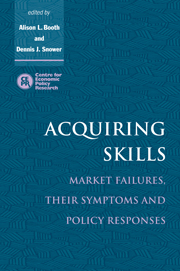Book contents
- Frontmatter
- Contents
- List of figures
- List of tables
- Preface
- List of contributors
- 1 Introduction: does the free market produce enough skills?
- Part I Market Failures: The Causes Of Skills Gaps
- 2 Transferable training and poaching externalities
- 3 Credit constraints, investment externalities and growth
- 4 Education and matching externalities
- 5 Dynamic competition for market share and the failure of the market for skilled labour
- 6 The low-skill, bad-job trap
- Part II Empirical Consequences Of Skills Gaps
- Part III Government failures and policy issues
- Index
5 - Dynamic competition for market share and the failure of the market for skilled labour
Published online by Cambridge University Press: 16 November 2009
- Frontmatter
- Contents
- List of figures
- List of tables
- Preface
- List of contributors
- 1 Introduction: does the free market produce enough skills?
- Part I Market Failures: The Causes Of Skills Gaps
- 2 Transferable training and poaching externalities
- 3 Credit constraints, investment externalities and growth
- 4 Education and matching externalities
- 5 Dynamic competition for market share and the failure of the market for skilled labour
- 6 The low-skill, bad-job trap
- Part II Empirical Consequences Of Skills Gaps
- Part III Government failures and policy issues
- Index
Summary
This chapter examines the market failures in skill acquisition arising from the interaction between skills and innovative success.
The chapter considers a process of dynamic competition in which firms view innovation as a way of competing for market share. In this context, the chapter focuses on an important characteristic of skilled workers: their adaptability. Skilled workers are regarded as being more flexible than unskilled workers, in the sense that the skilled workers can adapt to new technologies at lower cost than can the unskilled workers.
Thus the more skilled workers a firm employs, the cheaper will that firm's process of innovation be; consequently the more R&D it will undertake, the more profitable it will be, and the larger will be its market share. This, in turn, means that the higher will be the workers' return on acquiring skill. Moreover, the greater the return on skill acquisition, the greater will be the number of skilled workers available to the firm.
In such an economy, the marginal social product of a skilled worker comprises two terms. The first is the present value of all training costs that will be saved by using a skilled worker rather than an unskilled worker in production. The second is the increased value of profits in the economy, because, with the reduced cost of innovation brought about by this extra worker, the economy will end up with more successful firms and fewer unsuccessful firms. This latter term seems to capture formally what much of the informal discussion of skills gaps perceives as one of the benefits from having more skilled workers.
- Type
- Chapter
- Information
- Acquiring SkillsMarket Failures, their Symptoms and Policy Responses, pp. 81 - 108Publisher: Cambridge University PressPrint publication year: 1996



